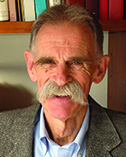
Nicholas C. Spitzer
University of California, San Diego
|
Primary Section: 24, Cellular and Molecular Neuroscience Secondary Section: 28, Systems Neuroscience Membership Type:
Member
(elected 2013)
|
Biosketch
Nicholas C. Spitzer is Distinguished Professor of Neurobiology and Director of the Kavli Institute for Brain and Mind (KIBM) atthe University of California, San Diego. He is a developmental neurobiologist known for studies of calcium-dependent embryonic neuronal excitability and activity-dependent neuronal differentiation. He identified a frequency code by which calcium signals instruct neural development and demonstrated that physiological calcium activity can respecify the neurotransmitters neurons express. His findings identify a form of neuronal plasticity shaping behavior. Spitzer was born in New York City and grew up in Princeton, NJ. He received his BA in biology from Harvard College in 1964, attended Harvard Medical School for several years and received his PhD in neurobiology in 1969 from Harvard University. After postdoctoral work at Harvard and University College London he joined the faculty at UC San Diego in 1972. He has been chair of the Biology Department, the Neurobiology Section and chair of the Academic Senate, and has served as a member of the NIH NINDS Council and as a Trustee of the Grass Foundation. He is editor-in-chief of BrainFacts.org, a fellow of the American Association for the Advancement of Science and member of the American Academy of Arts and Sciences.
Research Interests
Spitzer's research interests have focused on the role of electrical activity in development and function of the nervous system. Investigation of the differentiation of neuronal excitability led to the discovery of calcium-dependent action potentials in embryonic spinal neurons and identified voltage-gated currents, channels, and channel genes that generate them. He and his colleagues discovered distinct classes of calcium transients in neuronal growth cones that regulate the rate of axon extension, adhesion and turning. Calcium-dependent action potentials and novel calcium entry mechanisms produce spontaneous transient elevations of intracellular calcium at low frequencies and exert their effects via a frequency code. The neurotransmitters neurons employ are fundamental determinants of nervous system function and the choice of neurotransmitter in the mature nervous system was thought to be irreversibly specified early in development. Spitzer and his laboratory demonstrated that changes in electrical activity rapidly and reversibly reconfigure the transmitters and corresponding transmitter receptors that neurons express, both in the developing nervous system and in the mature brain, modulating the transcriptional code for transmitter specification. He showed that induction of transmitter expression can be achieved by selective activation of afferents recruited by a physiological range of sensory input and that newly expressed transmitters regulate behavior.

